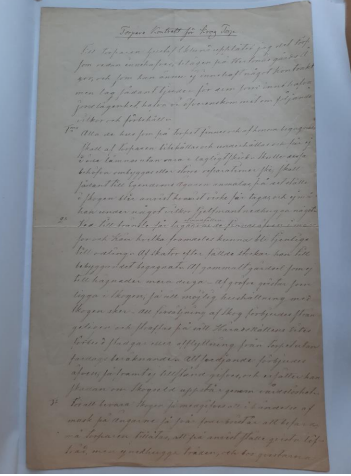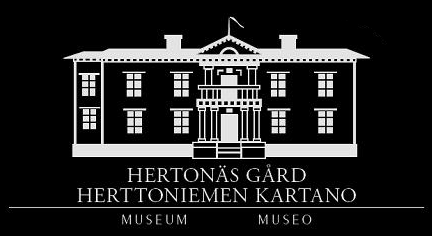A contract from the first of December 1858 is preserved at Hertonäs manor, which Stjernschantz drew up for a crofter named Gustaf Eklund. A crofter is a farmer who works on a small area of land leased to him, usually by a burgher. Through this contract, one can get a better picture of what a crofter's life was like in the mid-1800s, especially what was required of him.
Stjernschantz mentions at the beginning of the contract that the croft in question is located on Hertonäs manor's property, which means that this croft was probably located at or somewhere near present-day Hertonäs manor. The contract lists all the things that Stjernschantz and Gustaf Eklund have agreed on and it consists of 11 points in total. The contract begins by highlighting how all the buildings on the croft are to be maintained by the crofter and be in legal condition. However, the crofter must also report the repairs to the landowner, and he may not cut down trees in the forest without the landowner's permission.
However, it is pointed out that the crofter can use trees that have fallen in a storm, planks from the farm that are not suitable anymore or coarser twigs that lie in the forest as wood to set up fires. However, the wood may not be sold and is punished by, among other things, eviction. Burning is also prohibited and if forest fires occur due to negligence, the crofter must compensate for the damage. If a house should burn or a forest fire occurs, the crofter is obliged to pay twice as much as the damage cost. In addition, the crofter himself must rebuild the burnt houses without the help of the landowner.

The contract that’s preserved at Hertonäs Manor’s archive. Picture: Mikael Lindholm
The contract points out that the crofter has the right in the event of a fodder shortage, chop off twigs from deciduous trees, however, the twigs must be cut ½ cubit from the trunk, so that new shoots can grow. When bathing brooms are made, the ribbons must be made, not from small trees but from spruce twigs. The crofter must also beware of strangers who can damage the forest. If the offender is discovered and can be legally proven, Stjernschantz promises the informer 10 Rubles silver or half the penalty ban.
It is pointed out that the crofter should not let his cattle graze on the meadows of Hertonäs manor and if any cattle are caught by the workers at the manor, the crofter must redeem it for two rubles of silver. If it is a pig that made its way to the manor's fields or meadows and if it is not ringed, 50 kopecks must be paid for each such pig that has been caught. It is also mentioned that the crofter may not use the maids and farmhands of Hertonäs manor without permission. In addition, it is urged that fishing grounds may not be used without permission and the use of spirits is strictly prohibited and if this law is violated, it will be reported directly to a Crown servant.
The contract also lists what a crofter is obliged to work with on the croft. The main obligation of the crofters was to perform dagsverk (day’s work) i.e. work performed during a day. According to the contract, the crofter must: perform three horse day's work and 20 foot day's work a week. However, these day's work should not be carried out with child labor, but with proper people and even capable women are approved. The crofter shall spin 8 pieces of flax, malt a barrel of rye or barley and annually in the autumn deliver two coats of flax. The crofters will alternately travel to the church on Sunday to hear enlightenments. The crofter will maintain the country road all year round, even though Hertonäs manor shares the ownership of the Village Road with Viik’s Barn. The crofter shall pay everything the croft owes to the crown as well as other obligations.
As long as the crofter fulfills his contract, he is in possession of the crofting flat. If he were to break what was agreed, for example, by badly taking care of the houses, letting the fields or meadows become forested or not ditching, then the crofter can be considered incompetent. The crofter can then be dismissed, and he will have to move away. The move will take place in the autumn. Finally, it is mentioned that the contract will come into force on the first of May next year, i.e. in 1859. The contract ends by mentioning that the crofter received a witness copy of the contract. Mikael Lindholm’s historical internship at Hertonäs Manor Museum is financed by the Swedish Cultural Foundation in Finland.
Mikael Lindholm’s historical internship at Hertonäs Manor Museum is financed by the Swedish Cultural Foundation in Finland
